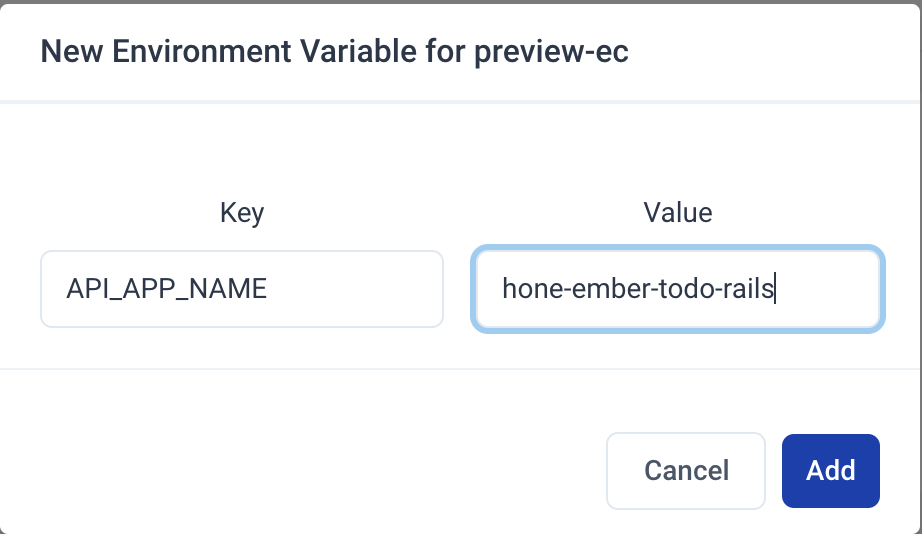The purpose of this add-on is to handle static and single-page hosting.
Credits
This add-on has been originally released by fagiani as a Cloud Native Buildpack.
Features
To
- serving static assets
- gzip on by default
- custom configuration
Installation
Note: This buildpack is not compatible with the Ruby buildpack
To install this add-on automatically when your app builds, add static.json file inside your app root directory.
The static.json file handles all the configurations described below.
Configuration
You can configure different options for your static application by editing the static.json in the root folder of your application.
Root
This allows you to specify a different asset root for the directory of your application. For instance, if you’re using ember-cli, it naturally builds a dist/ directory, so you might want to use that intsead.
{
"root": "dist/"
}
By default this is set to public_html/
Canonical Host
This allows you to perform 301 redirects to a specific hostname, which can be useful for redirecting www to non-www (or vice versa).
{
"canonical_host": "www.example.com"
}
You can use environment variables as well:
{
"canonical_host": "${HOST}"
}
Default Character Set
This allows you to specify a character set for your text assets (HTML, Javascript, CSS, and so on). For most apps, this should be the default value of “UTF-8”, but you can override it by setting encoding:
{
"encoding": "US-ASCII"
}
Clean URLs
For SEO purposes, you can drop the .html extension from URLs for say a blog site. This means users could go to /foo instead of /foo.html.
{
"clean_urls": true
}
By default this is set to false.
Logging
You can disable the access log and change the severity level for the error log.
{
"logging": {
"access": false,
"error": "warn"
}
}
By default access is set to true and error is set to error.
The environment variable STATIC_DEBUG can be set, to override the error log level to error.
Custom Routes
You can define custom routes that combine to a single file. This allows you to preserve routing for a single page web application. The following operators are supported:
*supports a single path segment in the URL. In the configuration below,/baz.htmlwould match but/bar/baz.htmlwould not.**supports any length in the URL. In the configuration below, both/route/foowould work and/route/foo/bar/baz.
{
"routes": {
"/*.html": "index.html",
"/route/**": "bar/baz.html"
}
}
Browser history and asset files
When serving a single page app, it’s useful to support wildcard URLs that serves the index.html file, while also continuing to serve JS and CSS files correctly. Route ordering allows you to do both:
{
"routes": {
"/assets/*": "/assets/",
"/**": "index.html"
}
}
Custom Redirects
With custom redirects, you can move pages to new routes but still preserve the old routes for SEO purposes. By default, we return a 301 status code, but you can specify the status code you want.
{
"redirects": {
"/old/gone/": {
"url": "/",
"status": 302
}
}
}
Interpolating Env Var Values
It’s common to want to be able to test the frontend against various backends. The url key supports environment variable substitution. For instance, if there was a staging and production app for your API, you could setup the config above like the following:
{
"redirects": {
"/old/gone/": {
"url": "${NEW_SITE_DOMAIN}/new/here/"
}
}
}
Then update the environment variable of each app with the proper setting:

Custom Error Pages
You can replace the default nginx 404 and 500 error pages by defining the path to one in your config.
{
"error_page": "errors/error.html"
}
HTTPS Only
You can redirect all HTTP requests to HTTPS.
{
"https_only": true
}
Basic Authentication
You can enable Basic Authentication so all requests require authentication.
{
"basic_auth": true
}
This will generate .htpasswd using environment variables BASIC_AUTH_USERNAME and BASIC_AUTH_PASSWORD if they are present. Otherwise it will use a standard .htpasswd file present in the app directory.
Passwords set via BASIC_AUTH_PASSWORD can be generated using OpenSSL or Apache Utils. For instance: openssl passwd -apr1.
Proxy Backends
For single page web applications like Ember, it’s common to back the application with another app that’s hosted on Heroku. The down side of separating out these two applications is that now you have to deal with CORS. To get around this (but at the cost of some latency) you can have the static buildpack proxy apps to your backend at a mountpoint. For instance, we can have all the api requests live at /api/ which actually are just requests to our API server.
{
"proxies": {
"/api/": {
"origin": "https://hone-ember-todo-rails.herokuapp.com/"
}
}
}
Interpolating Env Var Values
It’s common to want to be able to test the frontend against various backends. The origin key supports environment variable substitution using ${ENV_VAR_NAME}. For instance, if there was a staging and production app for your API, you could set up the config above like the following:
{
"proxies": {
"/api/": {
"origin": "https://${API_APP_NAME}.qoddiapp.com/"
}
}
}
Then update the environment variable of each app with the proper setting:

Custom Headers
Using the headers key, you can set custom response headers. It uses the same operators for pathing as Custom Routes.
{
"headers": {
"/": {
"Cache-Control": "no-store, no-cache"
},
"/assets/**": {
"Cache-Control": "public, max-age=512000"
},
"/assets/webfonts/*": {
"Access-Control-Allow-Origin": "*"
}
}
}
For example, to enable CORS for all resources, you just need to enable it for all routes like this:
{
"headers": {
"/**": {
"Access-Control-Allow-Origin": "*"
}
}
}
Precedence
When there are header conflicts, the last header definition always wins. The headers do not get appended. For example,
{
"headers": {
"/**": {
"X-Foo": "bar",
"X-Bar": "baz"
},
"/foo": {
"X-Foo": "foo"
}
}
}
when accessing /foo, X-Foo will have the value "foo" and X-Bar will not be present.
Route Ordering
- HTTPS redirect
- Root Files
- Clean URLs
- Proxies
- Redirects
- Custom Routes
- 404
Procfile / multiple buildpacks
In case you have multiple buildpacks for the application you can ensure static rendering in Procfile with web: bin/boot.
Was this helpful?
1 / 0